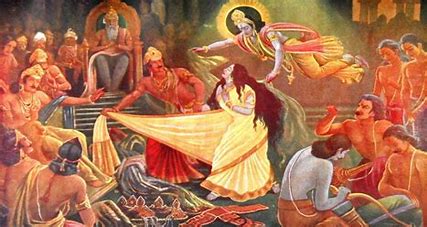Question: When Draupadi was being disgraced, why was Bhismadeva silent, although he was a Mahajana?
Answer by Romapada Swami:
In the Mahabharata, the disrobing of Draupadi is described in the Sabha Parva (“Book of the Assembly Hall”) and in Sisupala-vadha Parva (Chapters 65-78). Below is a summary of the views of multiple commentators on these relevant sections of Mahabharata.
- Bhisma’s Oath and Loyalty
(Adi-parva Ch 100): To secure the marriage of Satyavati to his father Santanu, Bhisma had taken the vow to always serve the king (of Hastinapura). This is considered as the primary reason for Bhisma’s silence. This is also the principle reason Bhisma agreed to fight for the Kauravas, knowing that they were unrighteous, against the pious Pandavas.
- Bhisma’s Conflicted Silence:
Bhisma is confused by the technicality of the principles of dharma (Sabha-parva Ch 68). At this point the Pandavas were clearly the slaves of Duryodhana and technically, everything that belongs to the slaves, including their wealth and family also belongs to the master. Therefore, Bhisma, rather than addressing the issue, defers to Yudhisthira.
- Implied regret:
Later, during his last moments, when instructing Yudhisthira (Santi-parva Ch 142), Bhisma states that dharma cannot be derived only from the letter of the law but also from the past conduct of moral persons and one’s own appreciation of the situation. Scholars/commentators consider this to be Bhisma’s regret at not objecting to the disrobing of Draupadi because he was too much caught in the analysis of the exact laws of religion applicable in that circumstance.
From Krishna Dharma’s Mahabharata:
Bhisma shed tears as Draupadi spoke. He looked at her with compassion and said, “O blessed lady, I have said that the ways of religion are subtle. Even wise men find it hard to understand them. Sometimes what a great and powerful man calls religion is accepted as such, even though it may not normally be so. What a weak man says, no matter how moral it may seem, is generally disregarded. From the importance of the matter you have raised, its intricacy and subtlety, I find myself unable to answer you.”
Bhisma stopped and looked around at the silent assembly. Turning back to Draupadi he continued, “It is certain that as the Kurus have become slaves of greed and folly, our race will soon be destroyed. O Pancali, that even under today’s circumstances you would turn to religion shows how worthy you are and adds glory to our house. Your husbands are equally praiseworthy. They do not deviate from virtue in such difficulty. The Kauravas, however, sit with downcast faces. They look as if they are dead. I do not think they are going to answer you. You should ask your question to Yudhisthira. He alone should say whether or not you have been won.”
From Hrdayananda Maharaja:
According to the text of the Mahabharata critical edition, Bhisma got stuck on a legal technicality. In a courtroom atmosphere, Draupadi made the argument that Yudhisthira could not gamble her away, since he had already lost himself. Being bereft of himself, he had no right to instruct or dispose of other souls.
Bhisma couldn’t decide what was right, whether Yudhisthira had or didn’t have the right to gamble Drupadi, and therefore he remained silent.







